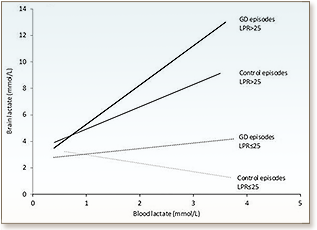 Lactate may represent a supplemental fuel for the brain. We examined cerebral lactate metabolism during prolonged brain glucose depletion (GD) in acute brain injury (ABI) patients monitored with cerebral microdialysis (CMD). Sixty episodes of GD (defined as spontaneous decreases of CMD glucose from normal to low [<1.0mmol/L] for at least 2h) were identified among 26 patients. During GD, we found a significant increase of CMD lactate (from 4±2.3 to 5.4±2.9mmol/L), pyruvate (126.9±65.1 to 172.3±74.1μmol/L), and lactate/pyruvate ratio (LPR; 27±6 to 35±9; all, p<0.005), while brain oxygen and blood lactate remained normal. Dynamics of lactate and glucose supply during GD were further studied by analyzing the relationships between blood and CMD samples. There was a strong correlation between blood and brain lactate when LPR was normal (r=0.56; p<0.0001), while an inverse correlation (r=-0.11; p=0.04) was observed at elevated LPR >25. The correlation between blood and brain glucose also decreased from r=0.62 to r=0.45. These findings in ABI patients suggest increased cerebral lactate delivery in the absence of brain hypoxia when glucose availability is limited and support the concept that lactate acts as alternative fuel.
Lactate may represent a supplemental fuel for the brain. We examined cerebral lactate metabolism during prolonged brain glucose depletion (GD) in acute brain injury (ABI) patients monitored with cerebral microdialysis (CMD). Sixty episodes of GD (defined as spontaneous decreases of CMD glucose from normal to low [<1.0mmol/L] for at least 2h) were identified among 26 patients. During GD, we found a significant increase of CMD lactate (from 4±2.3 to 5.4±2.9mmol/L), pyruvate (126.9±65.1 to 172.3±74.1μmol/L), and lactate/pyruvate ratio (LPR; 27±6 to 35±9; all, p<0.005), while brain oxygen and blood lactate remained normal. Dynamics of lactate and glucose supply during GD were further studied by analyzing the relationships between blood and CMD samples. There was a strong correlation between blood and brain lactate when LPR was normal (r=0.56; p<0.0001), while an inverse correlation (r=-0.11; p=0.04) was observed at elevated LPR >25. The correlation between blood and brain glucose also decreased from r=0.62 to r=0.45. These findings in ABI patients suggest increased cerebral lactate delivery in the absence of brain hypoxia when glucose availability is limited and support the concept that lactate acts as alternative fuel.